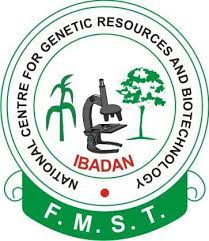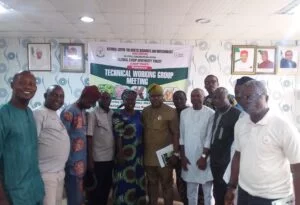Agriculture
NACGRAB: midwifing a food secured Nigeria through biotechnology

There is an area in the city of Ibadan, South-West Nigeria called Moor Plantation, named after a Colonial British High Commissioner, Sir Ralph Moor.
This location which is one of the oldest agricultural stations in Nigeria, could be referred to as the hub of agricultural institutions, research outfits, as well as agriculture education and training, in the ancient city.
In order to grow cotton to feed the British Textile Mills in 1905, the British Cotton Growers Association acquired 10.
35 square kilometres of land at the site known today as Moor Plantation.Five years later, in 1910, Moor Plantation had become the headquarters of the Department of Agriculture in Southern Nigeria.
It is also home to the first college of agriculture in the country and the whole of West Africa, the Federal College of Agriculture, formerly School of Agriculture, established in 1921.
Nestled comfortably in a serene section of Moor Plantation is the National Centre for Genetic Resources and Biotechnology (NACGRAB).
NACGRAB was established in 1987 by the Federal Ministry of Science and Technology.
Its mandate is to collect and conserve valuable genetic resources for food and agriculture and ensure that they are used sustainably.
NACGRAB is host to the National Varieties Release Committee (NVRC), as the agency serves as the committee’s secretariat.
The NVRC is responsible for scrutiny, registration, approval, and release of crop and animal varieties submitted to it by agricultural scientists, plant and animal breeders, seed companies, and research institutes among others.
The work of the committee is facilitated by NACGRAB with the required manpower and technology on and off the field to ensure its objectives and goal are actualized.
Dr Sunday Aladele, the Registrar of NVRC is also the Director of NACGRAB, at present.
In the last three years (December 2019 to January 2022) the Federal Ministry of Science and Technology released a total of 76 high yield crop varieties to Nigerian farmers through the NACGRAB based committee.
This regular release of high yield crop varieties, is to boost agriculture, make food available at cheaper rates, ensure bumper harvest at short intervals, and attain the desirable level of food security for the Nigerian populace.
A breakdown shows that 11 new crop varieties were released in December 2019, another batch of 18 varieties in December 2020, while 47 varieties were just released in January 2022.
Apart from this number, a cornucopia of other high yield crop varieties have been released during 27 meetings of the committee prior to December 2019.
At the 28th meeting of NVRC in 2019, chairman of the committee, Chief Oladosu Awoyemi said that the 11 varieties mentioned above, were approved for release out of a total of 20 crop varieties initially submitted to the Technical Sub – Committee on Crops for consideration.
Further details were given by the chairman of the crops sub – committee, Prof. Olusoji Olufajo who listed the new hybrid crops varieties as six maize, two castor, two yam, and one cowpea varieties.
Among the criteria used for the release of some of the varieties were, extra earliness and high grain yield, high protein content, high pro-vitamin A content, high yield, and tolerance to multiple stress.
Others were based on high seed yield and large endosperm, high yield, high oil content, early maturity and good oil physicochemical properties, slow rate of oxidation, good taste and high dry matter.
Good processing quality and good taste, resistance to legumes pod borer and early maturity were also taken into consideration before approval and release of some of the 11 varieties.
At the 2020 meeting, which was the 29th in the series, 18 new varieties were approved out of a total of 25 varieties submitted for consideration by research institutions, universities and private seed companies.
The varieties approved for release were two sweet sorghum varieties and four multipurpose cassava varieties.
They also included, one “poundable” cassava variety, two white maize hybrids, one yellow maize variety, and two pro- vitamin A maize varieties.
Others were, one medium maturing top – cross maize variety, two maize hybrids, and three yam varieties.
Apart from the 18 released varieties, two hybrid cotton were only registered by the Committee to serve as refuge for the released Biotechnology Cotton.
The 30th meeting of NVRC in January 2022 was a memorable event as a deluge was witnessed in the number of crops approved for release.
At the occasion, one of the highest if not the highest number of varieties in the history of the NVRC, 47 varieties, were approved for release at a sitting.
The 47 varieties were from a total of 49 varieties earlier submitted to the committee.
The released crop varieties included two rice hybrids, two high protein rich Oat varieties, three Durum wheat varieties, three pro-Vitamin A hybrid cassava, and 19 maize varieties.
It is noteworthy that when plant breeders, seed companies, and scientists come to NACGRAB, they are expected to always submit what is known as the Distinct Uniformity Stability (DUS) requirements of their crop varieties with the crops.
This is being done in order to ensure extra quality of the varieties and for them to meet international standards.
This means that all crop varieties must meet the DUS requirements of being distinct, uniform and stable for acceptance not only in Nigeria but in the West African sub-region.
Developers of crop and animal varieties bringing their samples for approval and release at NACGRAB come from within and outside Nigeria.
They include, the Institute for Agricultural Research, Zaria, the Raw Materials Research and Development Council, Abuja, and the International Institute of Tropical Agriculture, Ibadan.
Other developers are, the National Root Crops Research Institute, Umudike, the University of Ilorin, the Institute of Agricultural Research and Training Ibadan; and Seed Co. Nigeria Ltd.
The International Maize and Wheat Improvement Center, Kenya, Bayer Crop Science , Petit, South Africa, and the African Agricultural Technology Foundation, Kenya are also among developers of many varieties released so far.
The diverse origin of these plant breeders, scientists, seed companies and researchers is a testimony to the quality and global standard of NACGRAB’s outputs.
The committee is also responsible for the approval and release of animals, fish, and livestock of enhanced breeds.
But, in this area, not much success has been recorded as breeders are not forthcoming with samples and the NVRC can not approve and release what is not presented before it.
However, the committee has been persistent in its call on stakeholders to submit samples of animals, livestock and fishes of improved quality to it for approval and release.
Looking at its consistent activities so far, the NVRC seems to be the foremost committee under the umbrella of NACGRAB that is strategically midwifing the food security goal of the Federal Government for the masses.
This assertion is backed by the fact that high yield crop and animal varieties derived through biotechnology have been identified by many experts, as solutions to global hunger and malnutrition.
From the foregoing, it is apparent that for over 30 years, NACGRAB have really been working tirelessly to boost Nigeria’s agricultural productivity.
Some observers are also of the view that what NACGRAB’s effort, which is in line with President Muhammadu Buhari administration’s 9-point agenda, needs; is sustainability. (NANFeatures)
**If used, please credit the writer as well as News Agency of Nigeria (NAN)
Agriculture
Tiv Monarchs Give Herders Ten Days Ultimatum To Vacate Tiv Kingdom

By David Torough, Abuja
The Tiv Area Traditional Council during its emergency meeting held yesterday in the palace of the Tor Tiv in Gboko requested the Governor Hyacinth Alia led administration to create an enabling environment to allow herders’ peaceful exit of farmlands in Tiv Kingdom to facilitate resumption of farming activities.
Consequently, the Council directs political and traditional rulers in each local government area of Tiv Kingdom to peacefully engage the herders to ensure their exit from the local government areas to allow farming resumes.
The Council which was chaired by the Tor Tiv himself, HRM Prof James Ortese Iorzua Ayatse CFR equally appealed to all herders in Tiv Kingdom in Benue State to vacate all Tiv lands before the end of May 2025 to allow farmers return and cultivate their farms in order to avoid the looming hunger in Nigeria.
According to a Communique signed by the Secretary of the Council Mr Shinyi Tyozua which deliberated particularly on the security situation in Tiv Kingdom the Council enumerated the communities worst affected to include those in Kwande, Katsina Ala, Logo, Ukum, Guma, Makurdi, Gwer West Gwer East and Buruku Local Government Areas.
The Council lamented that farming activities in the kingdom have ceased due to the occupation of farmlands by herders for grazing and attacks and killings of farmers who fled stressing that if the situation continues it will ultimately result to hunger in Tiv Kingdom and Nigeria as a whole.
Agriculture
Ondo Govt. Destroys 200kg Seized Cocoa Adulterants

The Ondo State Government, on Thursday, destroyed 200kg adulterants used for adulteration of cocoa beans, seized from a merchant in Ondo West Local Government Area of the state.
Mr Segun Odusanya, Permanent Secretary in the Ministry of Agriculture and Forestry (Forestry and produce sub section), supervised the destruction of the 200kg bags of seized adulterants.
Odusanya explained that the destruction was part of government efforts to ensure that the state maintained quality cocoa production in the country.
“Mr governor, Lucky Aiyedatiwa, has reiterated the commitment to ensure the state remains the highest producing state with good cocoa quality
“Anyone caught engaging in illegal activities will be prosecuted accordingly.
“Moreover, this action was embarked on to warn cocoa merchants, who intend to engage in illegal activities, to rethink before getting into it.
“We are going to seal any store caught in such illegal activities, the products will be burnt while the merchant will be prosecuted according to the laws of the land.
“If we are saying we are the highest cocoa producing state and we continue to encounter this scenario, it will give us a bad publicity.
“The bad publicity will be in the country and extend to the international market, and we don’t want that,” he said.
The permanent secretary, therefore, commended Aiyedatiwa for graciously approving the recruitment of 60 new staff to checkmate the activities of cocoa merchants in the state.
“Mr governor has supported us, he has said we should recruit more people to guide against any adulteration and ensure we have a good quality cocoa beans.
“I must commended our task force committee for ensuring that the state holds its position in the country and the international market,” he said.
Earlier, Mr Tunji Akinnadeju, a Director of Produce (DP3) in the Grading and Allied Department of the ministry, said the adulterants were intercepted at Ondo West Local Government Area of the state.
Akinnadeju said that the owner of the adulterants took to his heels at the time of arrest.
“As we all know that cocoa is being sold in weight and after adding all these things, it will be sold at high prices, which is not good enough.
“So, doing that will bring a lot of damage to the image of the state and the country at large in the international market,” he said.
Also, Mr Sunday Adegbola, a Director of Produce Licensing in the ministry, said the merchants’ actions could affect people during consumption of the cocoa products, if care was not taken.
Adegbola, who pledged that the ministry would not rest until the state was free from adulterated cocoa beans, said the nefarious action could be attributed to the price tag at the international market.
“It is the price at the international market and the price is better for the farmers, not for the people who use adulterants.
“With this action, many people will drink cocoa as a chocolate powder and other materials from cocoa beans which has been adulterated.
“The consumption of these chemical products will also affect humans,” he said. (NAN)
Agriculture
NNPC Foundation Empowers Vulnerable Farmers in Oyo, Osun

No fewer than 500 farmers on Tuesday benefited from the NNPC Foundation agricultural training initiative for vulnerable farmers in Osun and Oyo States.
The training, marking the flag-off in the South-West zone of Nigeria, was held at the Ilora Baptist Grammar School, Ilora, Oyo State.
The foundation manages the Corporate Social Responsibility (CSR) initiatives of NNPC Limited, focusing on education, health, environment and energy access to communities nationwide.
The Managing Director of the foundation, Mrs Emmanuella Arukwe, said the initiative demonstrated the commitment to food security and economic empowerment for Nigerian farmers.
Arukwe, who was represented by Dr Bala David, the foundation’s Executive Director, Programme Development, said the project aimed to build resilience, boost productivity and promote sustainable agriculture.
“We are training 6,000 farmers across six zones in climate-smart practices, modern techniques, quality inputs, and market access,” she said.
She, therefore, urged farmers to participate actively and embrace the opportunity to help secure Nigeria’s food and economic future.
Mr Olasunkanmi Olaleye, Oyo State Commissioner for Agriculture and Rural Development, commended NNPC Foundation for the training and empowerment programme.
Olaleye, who was represented by Mr Olusegun Ezekiel, the ministry’s Director of Regulation and Enforcement, said empowering vulnerable farmers was crucial in addressing national food security challenges.
He added that the initiative aligned with Oyo State’s agricultural transformation agenda of Gov. Seyi Makinde.
“We remain committed to supporting initiatives that uplift farmers and improve productivity and livelihoods,” Olaleye said.
He encouraged participants to make the most of the training opportunity to improve their practices.
He also called for future collaboration between the foundation and the ministry to achieve greater impact.
The training consultant, Prof. Daniel Ozok, described vulnerable farmers as smallholders with an under-five-hectare farm size, mainly made up of women, youth, and the elderly.
“These farmers are most affected by climate shocks, hence the need for focused training,” Ozok said.
According to him, training equips them with modern techniques and strategies for improved productivity and market access.
Some of the participants expressed gratitude to NNPC Foundation and promised to apply the knowledge gained from the training.
NAN reports that a medical screening exercise was organised by the foundation for participants on the sidelines of the training.
Training initiative would later be held for farmers in Ekiti and Ondo States on a date different from that of Ogun and Lagos States. (NAN)
























